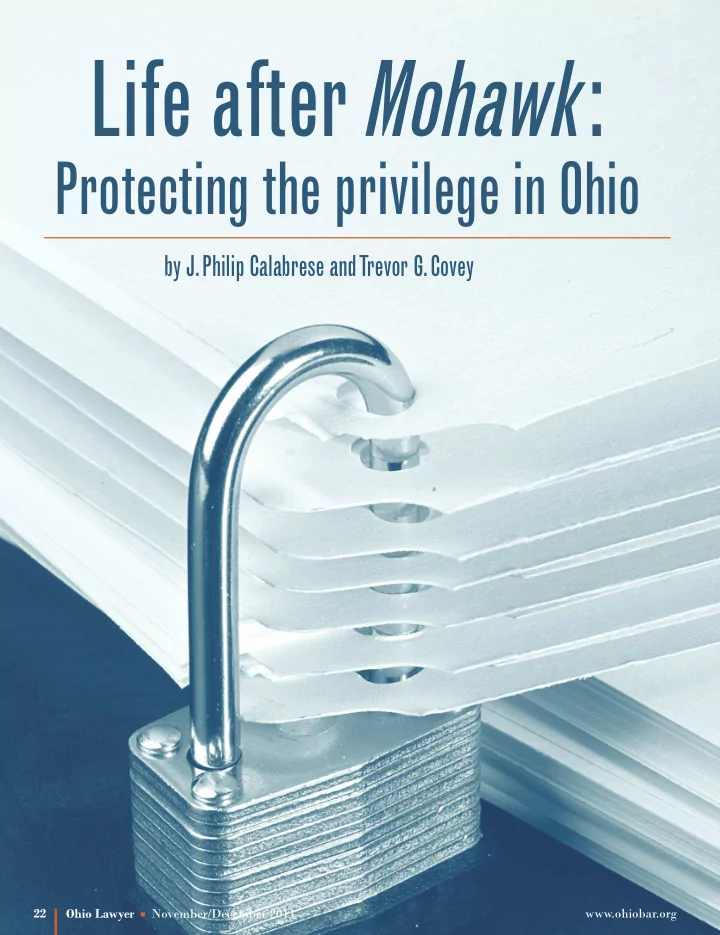

Life after Mohawk : Protecting the privilege in Ohio by J. Philip Calabrese and Trevor G. Covey 22 www.ohiobar.org Ohio Lawyer November/December 2011
An influential U.S. Supreme Court decision severely limits a party’s ability to protect privileged information through interlocutory review. Imagine a fairly typical scenario: In the dous leverage and powerful weapons orders compelling production of privi- rough and tumble of discovery in civil lit- against their opponents in discovery and leged information in federal court. The igation, you find yourself litigating forcing parties facing an order to disclose Supreme Court held that “disclosure or- against an opponent seeking information to make difficult decisions about their liti- ders adverse to the attorney-client privi- that you and your client reasonably be- gation strategy, including their willingness lege” do not “qualify for immediate appeal.” 7 There, Carpenter filed suit lieve is protected by a claim of privilege. to litigate at all. In cases pending in Ohio It might be a memorandum summarizing federal courts on the basis of diversity ju- against Mohawk claiming that he was ter- the interviews of several employee-wit- risdiction, however, there is hope. Ohio’s minated in violation of various federal nesses drafted by an in-house lawyer or interlocutory appeal statute should afford and state laws. Carpenter alleged that his an email from counsel to the board de- a party the opportunity for an interlocu- termination followed an email he sent scribing the company’s position in its tory appeal from an order compelling dis- alerting Mohawk’s human resources de- soon-to-be legal entanglement. Given the closure of privileged information. partment to the company’s employment importance of protecting the information of undocumented immigrants. At the Interlocutory review part and against disclosure, and with confidence in same time, Mohawk was defending a parcel of the privilege your position, you resist the discovery. class-action lawsuit relating to claims that The court sees it differently and orders the company employed undocumented In 1998 the Ohio General Assembly en- disclosure. Short of taking a contempt ci- workers. Carpenter was not aware of this acted R.C. 2505.02, which permits inter- tation, what are your options for protect- lawsuit when he sent the email, but after locutory appeals when “the appealing ing the privilege? sending it Mohawk personnel instructed party would not be afforded a meaningful him to meet with the company’s counsel or effective remedy by an appeal following Under Ohio law, litigants have a remedy. retained to defend the class-action. Car- final judgment as to all proceedings, issues, Under R.C. 2505.02, a party may take an claims, and parties in the action.” 3 Since penter alleged that he was terminated interlocutory appeal from an order com- when he refused to recant his statements then, Ohio courts have consistently held pelling production of information subject at the request of counsel. that discovery orders adverse to an alleged to a claim of privilege. But what if the attorney-client privilege are immediately case is pending in federal court pursuant The class plaintiffs caught wind of Car- appealable pursuant to R.C. 2505.02. 4 to diversity jurisdiction? Until recently, penter’s allegations, requested an eviden- the Sixth Circuit Court of Appeals recog- tiary hearing to explore them, and moved The rationale for this rule is simple: Once nized that the collateral order doctrine to compel Mohawk to produce informa- disclosure of such information has been might afford litigants an opportunity for tion pertaining to the meeting between made, there is no adequate remedy avail- interlocutory review. 1 In Mohawk Indus- Carpenter and the company’s counsel and able for protecting the privilege on appeal tries, Inc. v. Carpenter , the U.S. Supreme the subsequent termination decision. Mo- from final judgment. As the Supreme Court resolved a circuit split by holding hawk resisted discovery on the ground Court of Ohio has noted, “the proverbial that a party may not immediately appeal that the information sought was protected bell cannot be unrung.” 5 an order compelling production of privi- by the attorney-client privilege. The dis- Moreover, although R.C. 2505.02 lists leged information. 2 trict court granted the motion because, al- discovery of a privileged matter as an ex- though it determined that the privilege While technically limited to appeals based ample of a “provisional remedy,” both applied, it found that Mohawk had waived on the collateral-order doctrine, as a prac- Ohio case law and the General Assembly the privilege through its representations in tical matter, the Supreme Court’s decision have identified the privilege as a substan- the class-action suit. While the district in Mohawk has all but closed the door to a tial right. 6 court declined to certify an interlocutory party’s opportunity to protect privileged As a practical matter, Mohawk all but appeal under 28 U.S.C. §1292(b), it information through interlocutory re- stayed the case to provide an opportunity shuts the door to interlocutory review of view—providing litigants with tremen- www.ohiobar.org 23 November/December 2011 Ohio Lawyer
Recommend
More recommend